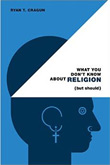Moral Truth, Moral Progress and Moral Relativity
Brandon Sun, September19, 2017 – David McConkey
A funny thing happened on the way to moral progress. And this time I don’t refer to the election of Donald Trump! Instead, this: the left wing and the right wing have switched sides. This subtle shift, happening over the past few decades, has been largely overlooked. What is going on?During the past half century in North America, moral progress has been dramatic. Everyone was suddenly challenged to adjust to new moral truths like racial equality, women’s rights and LGBT rights.
This moral progress encountered opposition. You might hear objections like these:
Objection to women’s rights: “Our religion does not accept the equality of men and women. Our religious texts prescribe separate roles for the sexes. Men are to be the head of their households and also have special religious privileges.”
Objection to LGBT rights: “Our culture does not recognize the legitimacy or morality of homosexuality. We don’t want to abandon our long-standing traditions for new-fangled ideas.”
What would you say to counter these objections? Would you say that their cherished cultural heritage and traditional religious teachings are wrong? That these ideas might have been OK long ago, but they are now out of date? That they are now sexist and bigoted? Talk about difficult conversations!
But instead of awkward confrontation, could there be an easy way out? Well, actually, there is. Say hello to “moral relativity,” which is also called “cultural relativity.” This concept was developed by anthropologists and other social scientists. It lets off the hook those cultures and peoples who are reluctant to adopt modern values. This theory even proposes that there are no universal moral truths, there are only different moral opinions.
A few decades ago, the left wing embraced the idea of moral truth and rejected the idea of moral relativity. Now the right has that position. What the heck happened?
To generalize greatly, there are the two sides in this drama. One side is the left wing, sometimes called “secular progressives.” The other side is the right wing, sometimes called “religious traditionalists.”
The left used to be clear: outdated cultural and religious beliefs had to be discarded to accommodate moral progress.
The right accepted moral / cultural relativity and made allowances for old-fashioned ideas. The right said: let people keep their traditional beliefs and customs. Also: don’t be so fast with change, give people time to adjust.
Somewhere along the way, though, the sides reversed themselves. Today, the right – in large measure – accepts moral progress. Now, the left is hedging. Hedging? Yes: by hesitating to condemn the sexism and homophobia of other cultures.
Here’s an example: the reception to prominent civil rights advocate Ayaan Hirsi Ali. A half century ago, Hirsi Ali would have been a hero to the progressive left. Today, she is shunned by the left, yet celebrated by the right.
I have applauded Hirsi Ali’s work in this space and reviewed two of her books. In 2010, I looked at Nomad, and last year, Heretic: Why Islam Needs a Reformation Now.
Hirsi Ali grew up as a Muslim in Somalia and Saudi Arabia. She was the victim of a rigid patriarchal society; she was even subjected to female genital mutilation. She escaped an arranged marriage (in Canada!) and became a refugee in the Netherlands. Despite death threats from jihadists, she is an indefatigable champion of women’s rights, children’s rights, gay rights, religious rights and free speech.
But after moving to the U.S., Hirsi Ali was offered work at right-leaning organizations. She has been warmly interviewed by the (right-wing) Sean Hannity on Fox News, but testily grilled by the (left-wing) Jon Stewart on “The Daily Show.” Hirsi Ali recently appeared before a U.S. congressional committee and was given the cold shoulder by three female Democratic senators.
What is going on? Are left-wing progressives exhausted from years of arguing about controversial topics? Why will they criticize outdated Christian beliefs, but make excuses for similarly outdated Islamic beliefs? Are progressives giving in to the easy option of moral relativity?
For the future, here are some directions and avenues of inquiry for me. There are moral truths, like universal human rights. Moral relativity is a bad idea. We must learn to respectfully deal with touchy, “politically incorrect” topics. Citizens have a vital role in creating a global civil society.
And finally, although there is much darkness today, there will be continuing moral progress. But some funny things may happen along the way!
* * *
See also:
Handling the Challenge of Generational Change
Expectations in the Wake of the Orlando Massacre
Spanking Shouldn’t be a Hit With Parents
Optimistic New Book From Muslim Writer
Book Provides Intriguing, Scientific Glimpse into State of Religious Beliefs
Reading the Qur’an Key to Understanding Islam
Popular Right Now:
- 15 Tips for Healthy Eating
- Quality of Life, Well-Being Research Something We Can Feel Good About
- Diets Don't Work, So What Does?
- Political Contributions: Top Ten Canadian Tax Tips
- Nestle Fitness 14 Day Weight Loss Program; What is Wrong Here?
- Charitable Donations: Top Ten Canadian Tax Tips
Must Read Books:
The 4-Hour Workweek:
Escape 9-5, Live Anywhere, and Join the New Rich

What You Don't Know About Religion (But Should)

In Defense of Food:
An Eater's Manifesto

The Life-Changing Magic of Tidying Up:
The Japanese Art of Decluttering and Organizing

Don't
Even Think About It:
Why Our Brains are Wired to Ignore Climate Change

Like This? Share It!
Press Ctrl + D to Bookmark!
